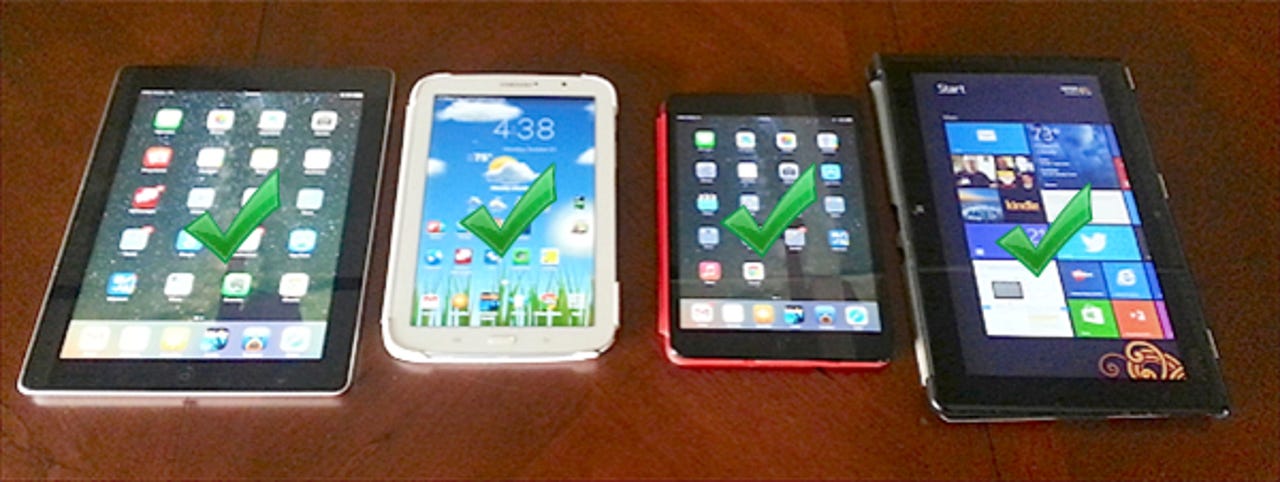Dirty little secret about tablets: The platforms are basically equal

Tablet owners will argue at length that their platform of choice is better than the others. It doesn't matter if the platform under discussion is iOS, Android, or Windows 8, they are convinced theirs is superior in almost every way. That may have been true in the past but not any longer. The fact is the three major tablet platforms are now pretty much the same.
I use all three platforms heavily, and I own tablets running each. It's not unusual for me to use a tablet for 8 hours or more on a given day. I consider myself knowledgable about all three tablet OSes, gained through actual usage and not just what I've read about them.
Gone are the days I must stop and think what I need to get done to determine what tablet/platform to use.
Some days I may use one tablet for half a day, and then switch off to another running a different OS. I may use a keyboard with these tablets or I may use the tablet only. I do things typically associated with tablets, and I do heavy work at times. My usage covers a broad spectrum, from surfing the web and consuming content to working with office documents.
I admit I am not a typical tablet user given my heavy usage, but I do all the same things most owners do. While I read ebooks, watch video, and listen to music like most tablet users, I also create a lot of content with them.
Featured
The many hours I've spent with a tablet in front of me has proven one fact that some may find hard to believe. I find the three platforms to be relatively equal in usability for typical tablet stuff. While each has particular strengths and weaknesses, they all are useful and each can hold its own against the others for tablet use.
Platform enthusiasts will consider this blasphemous, but I stand by my observations. There is relative parity across Windows 8, Android, and the iPads. They all do essentially the same things and they do them pretty much the same way. The user experience is pretty equal across the platforms. While users are all different and each will have his/her favorite platform, I feel confident that if tablets on the other platforms were used, many would be surprised to find the other two platforms were not inferior to their favorite.
This parity became evident to me when I realized I am able to use any platform on a daily basis. I can grab any tablet I have on any of the platforms and do whatever I need to do. The experience is basically the same across the platforms and I can do what I need on each.
Yes, there are apps that are better on one platform than the others, but not consistently so. I can't put my finger on a single function that typical tablet users would perform that isn't reliable on any of the three OSes. That's not to say that all apps on each OS are totally equal, rather the gaps that separated quality of apps across the platforms have closed more than many might believe.
Of course there are apps on one platform or another that I wish was better, but nothing that's a deal-breaker. Many apps are cross-platform and run on two of the platforms, and in some cases all three. Even if some apps don't run on all of the OSes, there are often alternative apps that do the same thing.
KitKat
The fact that I can pick up any tablet without regrets reflects a significant evolution in all the platforms. Gone are the days I must stop and think what I need to get done on a given day to determine what tablet/platform to use. I really can just grab one and get busy. That may be hard for some to believe, but it is the reality for this heavy tablet user. I think it is true for most tablet users.
There are technical differences among Android, Windows, and iOS, and some folks have requirements that makes one of them the only option. I believe that is the exception, and the vast majority of those interested in tablets would be well served by any of the platforms.
Others may be invested in an ecosystem associated with one of the platforms, and that will tie them into that OS. If that's not the case, it would be a shame to discount the other platforms out of blind loyalty. Give them all a chance and what you discover might surprise you. Once you realize all three platforms are pretty good, you'll discover your choices for tablets got a whole lot bigger.
